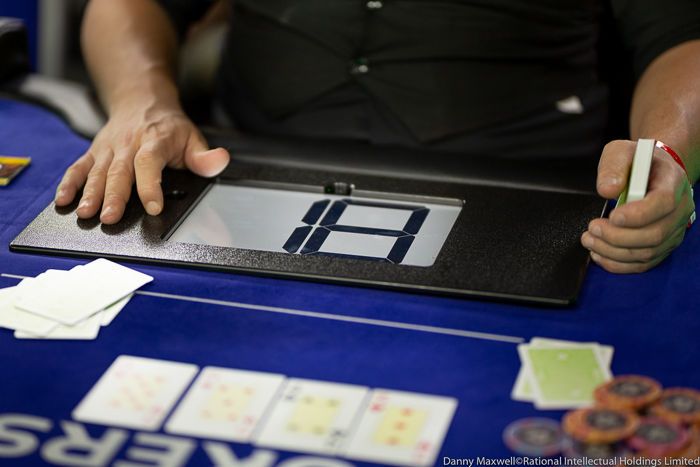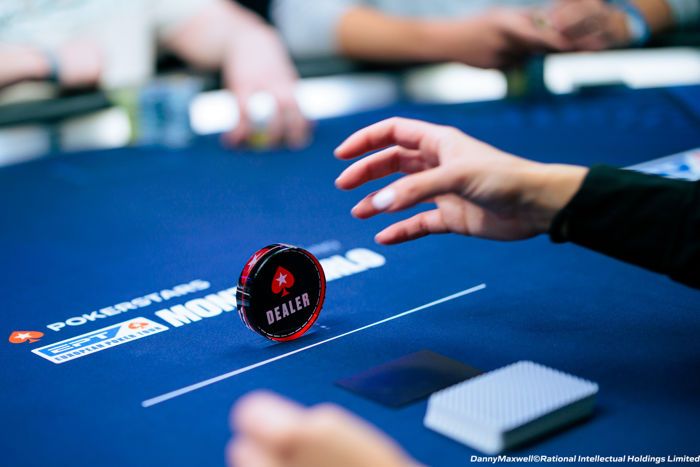
As it celebrates 20 years of the European Poker Tour (EPT) in Barcelona, PokerStars announced several rule and procedure changes to maintain game integrity, including new rules banning solvers and preflop charts for players and spectators alike.
Kenny Hallaert, a longtime tournament official who recently signed on as a PokerStars ambassador, announced the changes on social media on Monday as EPT Barcelona kicked off with the €1,100 Estrellas Poker Tour Main Event. They include reductions in shot clock time, new dealer guidelines and changes to the redraw process.
PokerNews spoke with the Belgian poker pro to learn more about the game integrity rule changes, the majority of which he said would be in place in Barcelona and going forward at future stops.
Follow the Estrellas Poker Tour Main Event!
PokerStars Addresses Solvers
Hallaert wrote that, as of EPT Barcelona and for EPT stops moving forward, “no use of GTO-solvers/charts or similar anywhere in the whole tournament area at any time, also not for spectators.”
The solver policy is outlined in a new addition to the PokerStars Tournament Poker Rules, stating that “players are not permitted to use at the table or anywhere in the tournament room area at any time game theory optimal (GTO) solver software, GTO charts (whether used on an Electronic Device or otherwise) or any AI tool or similar algorithmic software that is capable of affording the user a competitive advantage in the Tournament.”
“We also don’t allow any spectator to make any use of electronic devices with solvers inside the poker tournament area,” it continues.
The policy comes after a controversy at the World Series of Poker (WSOP) Main Event final table earlier this summer where champion Jonathan Tamayo was accused of consulting solver outputs on a laptop being used by his rail. Tamayo has since said that his rail was only helping him with “in-game adjustments” and that he wasn’t looking at any solver outputs.

Following “LaptopGate,” several notable pros, including Daniel Negreanu, have called on venues to clarify their solver policies and put rules in place to prohibit spectators from using solvers.
“There was a lot of debate in the last month after the Main Event … regarding the use of solvers,” Hallaert told PokerNews about the origins of the new rule.
Shot Clock Reduction
Another change being implemented by PokerStars involves shot clocks, which, up to this point, have given players 30 seconds to act. This will be lowered to 15 seconds, according to Hallaert, who noted that time banks will still be worth 30 seconds each.
The change is the latest effort to address stalling in poker tournaments, which can drastically slow down play as players try to sneak into the money or ladder up pay jumps.

“We did notice that a lot of people would try to purposely stall the game by taking almost their entire time bank pre(flop) or basically at every decision if we were near the bubble (or) on a pay jump,” said Hallaert. “So to improve the pace of play, we decided to go to 15 seconds.”
Hallaert added that the 15-second limit is “more in line with what other operators are already doing at the moment.”
No More Redraws
In another effort to address stalling in tournaments, there will no longer be three and two-table redraws in EPT events.
Instead of redrawing, there will be a random breaking order from five tables onward.
Hallaert noted that the redraw process can lead to stalling from short stacks in early position who know they can avoid playing the big blind if a player busts and the table breaks.
Moving to Sliding

One change that isn’t yet in place in Barcelona but will be gradually implemented moving forward involves the method by which dealers deal cards to players.
The majority of dealers pitch cards to players, which sometimes exposes the bottom of cards. Hallaert said he and other tournament officials were recently made aware of players potentially using hidden cameras in objects like AirPod cases to see the bottom of cards being pitched and “gain an illegal advantage.”
To avoid this, EPT dealers will slide cards to players going forward “so that the bottom of the card that’s being dealt to every player is still protected.”
Hallaert added that EPT officials were considering banning electronic devices from the table and rail outright but ultimately decided against doing so. “99.99% of the time, players don’t have a bad intention (when using electronic devices),” he said.
Most players have reacted positively to the proposed rule changes, according to Hallaert. That includes 2013 EPT Monte Carlo champion Steve O’Dwyer, who said he’s long pushed for the switch from pitching to sliding.
“Finally,” O’Dwyer wrote on X, “I’ve been advocating for this change for over a decade.”
Not all players were on board with the changes. German pro Dominik Nitsche, who was at the center of the Main Event solver controversy, criticized the new solver rule as “poorly written” and argued that it would be difficult or impossible to enforce.





